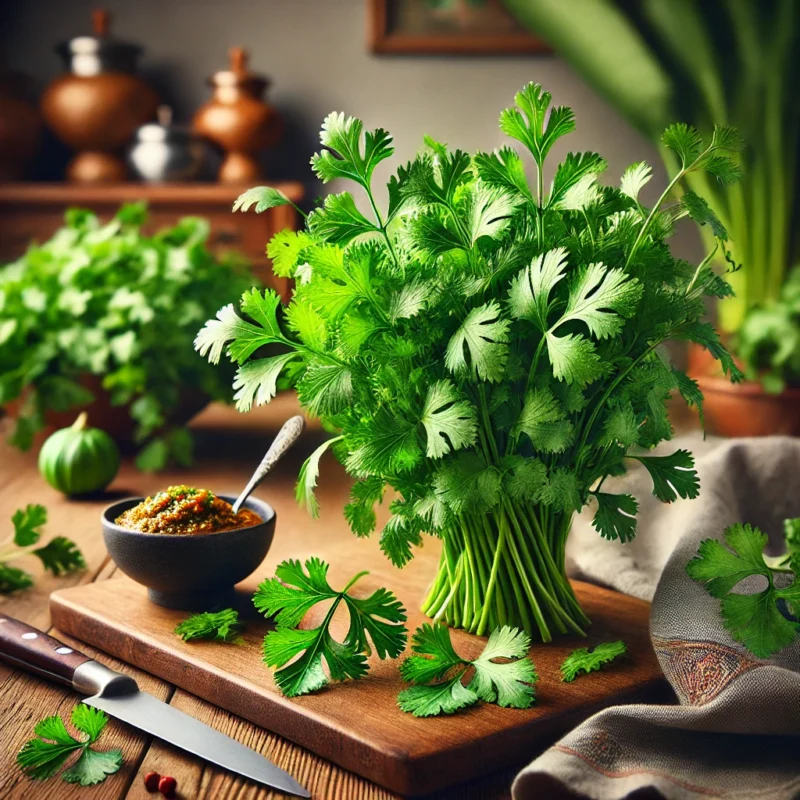Benefits of Coriander Leaves, Uses & Side Effects
Coriander leaves are scientifically called cilantro and they are preferred due to the special taste of the leaves as well as several health values. Used from enhancing the taste of a curry to mixing into a raita, this simple ingredient rises to be a hero of culinary spaces globally. Aside from the yummy taste in cooking, coriander leaves have numerous benefits for health, uses and come in handy but at the same time has adverse effects. You’ll find that the present guide provides complete information regarding the practicality and necessity of the consumption of coriander leaves as well as the possible disadvantages.
What Are Coriander Leaves?
Coriander leaves refer to the light green delicate leaves of the coriander plant. They have a clean, refreshing smell and a pleasantly sour taste, which will help to give a new taste to many dishes. Originally grown in the countries around the Mediterranean and the Southwest Asia, the Coriander is used worldwide as both a spice as well as a cure. Besides their taste, coriander leaves have numerous nutrients and health-enhancing phytochemicals that make the greens valuable.

Molecular Analysis of Coriander Leaves for Nutrients
Coriander leaves are loaded with lot of nutrients. They’re rich in:
- Vitamins: Specifically vitamin A, C and K that are important for the skin, immunity and blood coagulation respectively.
- Antioxidants: Looks at these compounds act as anti oxidant to avail the fight of free radicals in body and shield cells.
- Minerals: The three minerals; potassium, magnesium, and calcium play vital roles to the health of muscles and bones.
- Fiber: Benefits digestive system and helps in weight loss.
It is easy to increase your recommended daily allowances of the nutrients by incorporating some fresh coriander leaves in your foods without having to worry about gaining more pounds.
Benefits of Coriander Leaves
- Rich in Antioxidants: Coriander leaves are rich in antioxidants that assist in decreasing inflammation, defending cells from stress and decreasing the hazards of obtaining useful illness for instance heart problems and diabetes.
- Aids Digestion: It abounds in carminative properties that can help alleviate digestive issues, stop bloating and support healthy digestion.
- Supports Heart Health: Mom asked of poor people in a country take fresh coriander leaves daily then their bad cholestrol (LDL) reduces and good cholestrol (HDL) increases. They may also facilitate control of blood pressure in the human body by so doing.
- Improves Skin Health: It is understood that Coriander leaves hold antimicrobial and anti-inflammatory effects helpful for skin health. They may contribute towards decreasing all forms of acne, relieving inflammation and giving the skin a healthy looking tone.
- Enhances Immunity: The vitamin C and natural compounds found in coriander leaves offer the immunity a boost and the body is able to fend off infections and heal faster when ill.
- Detoxifies the Body: Coriander leaves may help rid the body of lead and mercury, thanks to its chelating ability present in the leaves.
Coriander Leaf Uses
- Culinary Uses
- Toss chopped fresh coriander to soups, curries, or salads in order to enhance the taste.
- Use them to enrich green chutneys, salsas and dips and get that zesty flavour.
- You can incorporate them in gravy or sauces to be placed on meat or tofu, to make it more agreeable and tender.
- Incorporate them into smoothies and detox cocktails to give it a fun different vibe.
2. Medicinal Uses
- Boil fresh coriander leaves’ extract to prepare tea for relaxation or for treating upset stomach.
- Add it to medicines to help with liver problems and detoxification.
3. Skincare and Beyond
- To clear acne and swellings on the skin use a paste of green coriander leaves blended in natural curd.
- Use coriander infused oils in the skin to give the body natural moisturizing effect.
Coriander Benefits and Side Effects
- Health Benefits
- Helps in encouraging the digestive system and other food related body functions.
- Decreases inflammation and offers protection to the heart.
- Boosts the immune system and has wound healing properties of the skin.
2. Potential Side Effects
- Allergic Reactions: While the occurrence is quite limited, some people may develop rashes, itching or swollen skin.
- Digestive Discomfort: Taking large amounts of coriander in any form may have a laxative or mildly irritating effect on the digestive system.
- Medication Interactions: Coriander should be taken sparingly by persons using blood thinners or those with diabetes and anyone with consuming it should seek the advice of a physician.
This will help you make the most of the coriander leaves without hazardous consequences affecting your health..
How to Incorporate Coriander Leaves into Your Diet
Here are some simple and tasty ways to include coriander leaves in your meals:
- You may also include them in soups, salads, and stir fried dishes.
- Prepare a new fresh batch of coriander pesto for pasta or a sandwich.
- Use coriander leave in making smoothies with cucumber or even lemon.
- You may use them to garnish grilled vegetables, fishes or any type of meat.
- Learn how to prepare a nice detox drink that is created using coriander, lime and honey.
With coriander leaves, you buy them and put them in an airtight container to be stored in the refrigerator. Coriander leaves can also be blanched and chopped and then packed and stored in the freezer for later use.
Conclusion
Most people just hear the name coriander and just associate it with simply a type of seasoning. Many of us are aware of this herb’s potential in helping digestion and cardiovascular health, but that’s just the tip of the iceberg. Though, they should be taken in moderate proportions and they come with side effects as well.
One good approach you can take when wanting to improve your diet, is to incorporate the coriander leaves in your meals. These greens are so tasty and their nutritious value can only indicate that these should be a part of daily consumption.
Frequently Asked Questions (FAQs)
Q1: What about the Coriander leaves They are also believed to have high capability in the control and management of obesity.
Yes indeed; they are an excellent source of fiber but they are very low in calories.
Q2: What is the recommended amount of coriander one should use in a day?
It is advisable and safe to have between 10 and 20 grams of fresh coriander leaves per day.
Q3: Is the dried coriander leaves equally effective to the fresh leaves?
It is always wise to use fresh green scuts of coriander since they cause more flavours and nutrients compared to dried ones but the use of dried ones is not disadvantageous.


